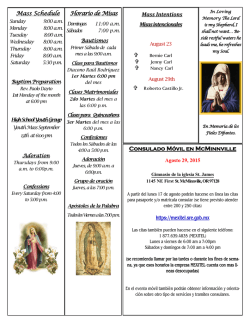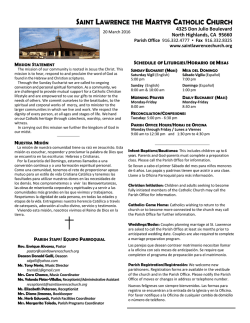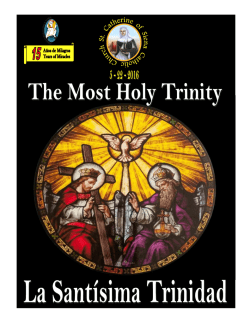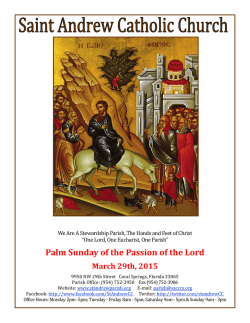
Follow the Holy Spirit to Heaven
Discovering hope and joy in the Catholic faith. March 2015 Church of St. Raymond Rev. Msgr. John J. Graham Follow the Holy Spirit to Heaven St. Agnes of Bohemia Imagine refusing marriage proposals from not one but two kings and the Holy Roman Emperor. For Agnes, daughter of Queen Constance and King Ottokar I, none but the King of Heaven could win her heart. In 1236, after financing the construction of a Poor Clare monastery in Prague, she entered this monastery with seven other noblewomen. Agnes became known for prayer, obedience and mortification. She turned her back on her fortune and embraced poverty and kindness. Year of Consecrated Life Pope Francis declared this the Year of Consecrated Life. Celebrate the Church’s treasure of those in consecrated life. (See www.usccb.org for details.) “Dear brothers and sisters, may (the) Lenten season find the whole Church ready to bear witness to all those who live in material, moral and spiritual destitution, the Gospel message of the merciful love of God our Father, who is ready to embrace everyone in Christ.” Pope Francis © Copyright 2015 Success Publishing & Media, LLC During Lent, Catholics everywhere sharpen their consciences to prepare for Easter. As temples of the Holy Spirit, it is critical that we keep ourselves in mint condition. Nevertheless, even the most diligent caretaker can miss something. Fortunately, we have the Holy Spirit to assist with our Spring tune-up. Give God full attention. Whether it’s by meditating on the limitless nature of his love, or by making sacrifices like turning off music or TV to better hear the whispering of the Holy Spirit (1 Kings 19:12), occasional silence is essential to learn how the Holy Spirit wants to work in our lives. Read love letters from the Lord. Since humans were inspired by the Holy Spirit to write the Bible, studying it is like having a conversation with the Lord. What better way could there be to strengthen our relationship with him than by reading and meditating on his very words? Open the floodgates of grace. Growth in our relationship with God comes through grace. For example, we obtain grace by receiving him in the Eucharist at Mass, or obtaining guidance and forgiveness from him in the Sacrament of Penance and Reconciliation. The means by which we may receive grace are endless. The Holy Spirit guides the Catholic Church, so it makes sense to make the Holy Spirit our guide, too. Why do Catholics call Jesus, “Lord”? The word “lord” refers to someone having power or authority. When we call Jesus, “Lord,” we acknowledge his power over sin and death as evidenced by his Crucifixion and Resurrection. We dedicate ourselves to his service. “The New Testament uses this full sense of the title ‘Lord’ both for the Father and…for Jesus, who is thereby recognized as God himself” (Catechism of the Catholic Church, #446). Therefore, Christians bend our knees to him as our Lord and no one else. March 2015 Page 2 Accept your gifts from the Holy Spirit To guide us in our spiritual growth, the Holy Spirit offers us gifts of sanctifying grace. These gifts perfect basic virtues that will lead us to Heaven. When properly used, we stay focused on God. Wisdom: This gift helps us stay focused on God's will and his plan for us. Understanding: Lets us grasp truths. It means seeing with the heart, not just the mind. Counsel: Also called "right judgment," counsel enables us to weigh all the alternatives to make the right choice. Fortitude: The ability to remain firm against all pressures. (Also called courage.) Knowledge: A person with knowledge sees more than one dimension of an issue to determine the right path. Piety: Helps us think of ourselves as children of God and be eager to serve him. Fear of the Lord: The wonder and awe God inspires encourages us to respect him and all his creations. Accepting these gifts means identifying and using them. Just don't forget to call on the Holy Spirit for guidance when you do. Mark 14:1-15, 47, Make Jesus’ Passion our own. It is important to recall the events of Jesus’ Passion. It is even more important to share in his suffering and great love during his Passion. St. Paul said, "We hold this treasure in earthen vessels … always carrying about in the body the dying of Jesus, so that the life of Jesus may also be manifested in our body" (2 Corinthians 4:7-10). He means that everything that happens in our lives – the good and the bad – can be part of our bond with Jesus. Every day our frustrations, our fears, our loneliness, our temptations, can become ways in which we share in the suffering and death of Christ. Likewise, our joys, our good health, our family, our friends, are all important ways to share in the joy of his Resurrection. The point is to offer everything to Christ. St. Alphonsus wrote, "We should consider not so much the sorrows Jesus suffered as the love with which he bore them." Disciples of Jesus can have the same attitude toward suffering as he did and can share in his joy of Resurrection. March 9 – St. Frances of Rome (1440). Although she preferred a life of service, Frances’ parents selected a nobleman as her husband. She and a new sister-in-law formed a society of women to serve the poor. Frances continued to honor her family and serve the poor. March 17 – St. Patrick (493). Born in Scotland, St. Patrick was kidnapped and brought to Ireland as a slave. He escaped but later returned as bishop of Ireland and is credited for establishing the Church there. March 23 – St. Toribio de Mogrovejo (1606). A brilliant scholar, he was working as a professor when chosen to lead the archdiocese of Lima in Peru. He was ordained priest and bishop and worked to strengthen his diocese. March 29 – Palm Sunday of the Lord’s Passion. The Sunday before Easter is called Palm Sunday of the Lord’s Passion because it recalls Jesus’ triumphant entry into Jerusalem when he was greeted by crowds waving palms and cheering. It marks the beginning of Holy Week. Are Christians required to be pacifists? Jesus told his disciples, “… offer no resistance to one who is evil. When someone strikes you on (your) right cheek, turn the other one to him as well” (Matthew 5:39). He wanted his disciples to strive for peace when confronted with violence because he knew that “all who take the sword will perish by the sword” (Matthew 26:52). We are never to use violence to solve problems. That doesn’t mean, however, that we are required to stand by while others attempt to deny either the individual citizen or particular governments fundamental rights, including that of self-defense. War can be morally justified as a last resort but we should do everything possible to avoid war before it starts. Certainly Christians must speak out against acts that provoke war. Too, we are required to fight racial, ethnic and religious discrimination. Better still, when we fight injustice, we actually work to promote peace. That’s the Christian way. In fact, Jesus turned the violence of the Cross into the ultimate act of love. To provide practical ideas that promote faithful Catholic living. Success Publishing & Media, LLC Publishers of Growing in Faith™ and Partners in Faith™ (540)662-7844 (540)662-7847 fax http://www.growinginfaith.com (Unless noted Bible quotes and references are from the Revised Standard Version and the New American Bible) © Copyright 2015 Success Publishing & Media, LLC Descubriendo esperanza y gozo en la fe católica. Marzo de 2015 Church of St. Raymond Rev. Msgr. John J. Graham El Espíritu Santo nos guía hacia el cielo Santa Inés de Bohemia Imaginen rechazar propuestas de matrimonio no de un rey sino de dos y del Sacro Emperador Romano. En el caso de Inés, hija de la reina Constanza y del rey Otokar I, nadie más que el Rey del Cielo podía ganar su corazón. En 1236, tras financiar la construcción de un monasterio de clarisas pobres en Praga, ingresó en este monasterio junto con otras siete mujeres nobles. Inés se dio a conocer por su vida de oración, obediencia y mortificación. Dio la espalda a sus riquezas y aceptó la pobreza y la bondad. Año de la vida consagrada El papa Francisco ha declarado este año el Año de la vida consagrada. Celebren el tesoro que tiene la Iglesia en los dedicados a la vida consagrada. (Vayan a www.usccb.org para más detalles.) “Queridos hermanos y hermanas, que la Cuaresma encuentre a la Iglesia dispuesta para testimoniar a cuantos viven en la indigencia material, moral y espiritual el mensaje que el Evangelio nos transmite del amor misericordioso de Dios nuestro Padre, quien está listo para abrazarnos a todos en Cristo”. Papa Francisco © Copyright 2015 Success Publishing & Media, LLC Durante la Cuaresma, los católicos del mundo entero aclaran sus conciencias a fin de prepararse para la Pascua. Somos templos del Espíritu Santo y como tales es crucial que estemos en perfectas condiciones. Sin embargo, hasta al vigilante más diligente puede escapársele algo. Por suerte tenemos al Espíritu Santo que nos ayuda con nuestra puesta a punto primaveral. Préstele atención absoluta a Dios. Bien meditando sobre la naturaleza infinita de su amor, bien haciendo sacrificios como apagar la música o la TV para escuchar mejor los susurros del Espíritu Santo (1 Reyes 19:12), el silencio esporádico es imprescindible para enterarnos de cómo quiere el Espíritu Santo obrar en nuestras vidas. Lea las cartas de amor del Señor. Como los seres humanos recibieron la inspiración del Espíritu Santo para escribir la Biblia, estudiarla es como conversar con el Señor. ¿Qué mejor forma de fortalecer nuestra relación con Él que leer y meditar sobre sus propias palabras? Abra las compuertas de la gracia. Nuestra relación con Dios crece por la gracia. Por ejemplo, obtenemos gracia cuando en la misa lo recibimos a Él en la Eucaristía o cuando buscamos su guía y su perdón en el sacramento de la Penitencia y la Reconciliación. Los modos de recibir la gracia son infinitos. El Espíritu Santo guía a la Iglesia Católica así que es lógico que el Espíritu Santo sea también nuestro guía. ¿Por qué llaman los católicos “Señor” a Jesús? La palabra “señor” indica que alguien tiene poder o autoridad. Cuando llamamos “Señor” a Jesús reconocemos su poder sobre el pecado y la muerte tal como lo manifiestan su Crucifixión y su Resurrección. Nos dedicamos a su servicio. “El Nuevo Testamento utiliza en este sentido fuerte el título ‘Señor’ para el Padre y… para Jesús reconociéndolo como Dios” (Catecismo de la Iglesia Católica, #446). Así pues, los cristianos doblamos nuestra rodilla ante Él reconociendo que es nuestro Señor. Marzo de 2015 Página 2 Aceptar los dones del Espíritu Santo Para guiarnos en nuestro crecimiento espiritual, el Espíritu Santo nos ofrece los dones de la gracia santificante. Estos dones perfeccionan las virtudes básicas que nos conducirán al cielo. Cuando los usamos adecuadamente, prestamos toda nuestra atención a Dios. Sabiduría: Este don nos ayuda a concentrarnos en la voluntad de Dios y en su plan para nosotros. Entendimiento: Nos permite comprender la verdad. Implica ver con el corazón, no sólo con la mente. Consejo: Llamado también “juicio justo”, el consejo nos permite sopesar todas las alternativas para elegir bien. Fortaleza: La habilidad de permanecer firmes frente a las presiones. (Llamado también coraje.) Ciencia: Una persona con ciencia ve varias dimensiones en cada asunto a fin de determinar cuál es el camino recto. Piedad: Nos ayuda a pensar en nosotros mismos como hijos de Dios y a desear servirlo. Temor de Dios: La maravilla y el asombro que Dios nos inspira nos anima a respetarlo a Él y a sus criaturas. Aceptar estos dones conlleva que los identifiquemos y que los usemos. Pidan al Espíritu Santo que los guíe. Marcos 14:1-15, 47, Hagamos nuestra la Pasión de Jesús Es importante recordar los acontecimientos de la Pasión de Jesús. Es aún más importante tomar parte de su sufrimiento y de su gran amor durante su Pasión. San Pablo dijo: “Llevamos este tesoro en recipientes de barro… Llevamos siempre en nuestros cuerpos por todas partes la muerte de Jesús, a fin de que también la vida de Jesús se manifieste en nuestro cuerpo” (2 Corintios 4:7-10). Quería decir que todo lo que ocurre en nuestra vida—lo bueno y lo malo—puede ser parte de nuestro vínculo con Jesús. Cada día nuestras frustraciones, nuestros miedos, nuestra soledad, nuestras tentaciones pueden convertirse en formas de participar en el sufrimiento y la muerte de Cristo. Así mismo, nuestros gozos, nuestra buena salud, nuestra familia, nuestros amigos, son formas importantes de participar en el gozo de su Resurrección. Lo importante es ofrecer todo a Cristo. San Alfonso escribió: “Debemos tener en cuenta no tanto los dolores que Jesús sufrió como el amor con el que los soportó”. Los discípulos de Jesús pueden tener la misma actitud que Él tuvo hacia el sufrimiento y podemos participar del gozo de su Resurrección. 9 de marzo – Santa Francisca Romana (1440). Aunque deseaba hacerse religiosa, los padres de Francisca seleccionaron a un joven noble para que se casara con él. Ella y su cuñada fundaron una sociedad de mujeres que atendían a los necesitados. Francisca se ocupó de su familia y sirvió a los pobres. 17 de marzo – San Patricio (493). Nacido en Escocia, san Patricio fue raptado y llevado como esclavo a Irlanda. Se escapó pero regresó más tarde como obispo de Irlanda y se le atribuye el establecimiento de la Iglesia en la isla. 23 de marzo – Santo Toribio de Mogrovejo (1606). Estudioso brillante, trabajaba como profesor cuando fue elegido para dirigir la archidiócesis de Lima en Perú. Fue ordenado sacerdote y obispo y se dedicó a fortalecer su diócesis. 29 de marzo – Domingo de Ramos de la Pasión del Señor. El domingo anterior a la Pascua se llama Domingo de Ramos de la Pasión del Señor porque rememora la entrada triunfal de Jesús en Jerusalén cuando fue recibido por una multitud que agitaba palmas y lo vitoreaba. Este día comienza la Semana Santa. ¿Es obligatorio que los cristianos sean pacifistas? Jesús dijo a sus discípulos: "... no resistan al mal; antes bien, al que te abofetee en la mejilla derecha, ofrécele también la otra" (Mateo 5:39). Quería que sus discípulos buscaran la paz cuando se enfrentaran a la violencia porque sabía que "todos los que empuñen espada, a espada perecerán" (Mateo 26:52). Jamás debemos usar la violencia para resolver problemas. No obstante, eso no significa que debamos cruzarnos de brazos cuando otros tratan de privar a los individuos o a los gobiernos de sus derechos fundamentales, incluyendo el de la defensa propia. La guerra puede ser justificada moralmente como el último recurso pero debemos hacer todo lo posible para evitarla antes de que empiece. Los cristianos tienen que hablar contra las acciones que provocan la guerra. Además estamos obligados a luchar contra la discriminación racial, étnica y religiosa. Es más, cuando luchamos contra la injusticia nos estamos esforzando por promover la paz. Esto es vivir como cristianos. Jesús convirtió la violencia de la Cruz en el acto supremo de amor. Proporcionar ideas prácticas que fomenten la vida en la fe católica Success Publishing & Media, LLC Publishers of Growing in Faith™ and Partners in Faith™ (540)662-7844 (540)662-7847 fax http://www.growinginfaith.com (Salvo advertencia, las citas y referencias bíblicas son de la Biblia de la Biblioteca de Autores Cristianos o de la Nueva Biblia de Jerusalén.) © Copyright 2015 Success Publishing & Media, LLC
© Copyright 2026









